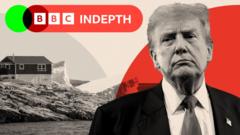Donald J. Trump has ramped up his rhetoric surrounding U.S. control of the Panama Canal, claiming exorbitant fees from Panama and alleging foreign military involvement, igniting longstanding Republican discussions on the canal's status.
Trump's Controversial Stance on Panama Canal Control

Trump's Controversial Stance on Panama Canal Control
President-elect's remarks stir debate within GOP over canal's management.
President-elect Donald J. Trump has recently intensified rhetoric on the topic of the Panama Canal, asserting that Panama is imposing “exorbitant prices” on U.S. vessels transiting this crucial shipping artery. In a series of statements and social media posts, Trump has raised unfounded accusations that Chinese soldiers are stationed at the canal, which he deems a matter of urgency that must be addressed upon taking office next month.
Trump's outburst included a warning that if Panama does not lower the canal fees for U.S. ships, he will insist that the United States reassert full control over the canal. His remarks were underscored during the announcement of his ambassador nominee, Kevin Marino Cabrera, with Trump accusing the Panamanian authorities of exploiting American interests.
The controversy surrounding the Panama Canal and its transfer of control to Panama in 1999 under President Jimmy Carter has long been a point of contention among certain factions of the Republican Party. Historical rhetoric echoes through the years, with former President Ronald Reagan famously declaring that the canal rightfully belongs to the United States, stirring nationalistic sentiments during his campaign.
Ryan C. Berg, director at the Center for Strategic and International Studies, suggested that some Republicans continue to harbor skepticism regarding the 1978 treaties that facilitated the handover. While Trump's fixation on the canal's management invokes past grievances, the implications of reasserting control remain controversial and complex, given historical commitments and international relations.























